
Funding
Funding by the Federal Government
Sufficient public funding for AI promotion measures is necessary to continue establishing Germany as a location where AI is researched, applied and transferred. To this end, additional financial resources have been made available since 2019, particularly as part of the German government's AI strategy. The German Federal Government has invested an additional €3.01 billion in specific AI projects in Germany. Of this amount, €1.97 billion have already been spent on the projects that for the most part are perennial.
With total investments of around €58 billion in 2023, Germany consolidated its leading position within the European Union as a leading location for investment activity.
Additional investment in AI funding by the Federal Government since 2019 (as of January 2024)
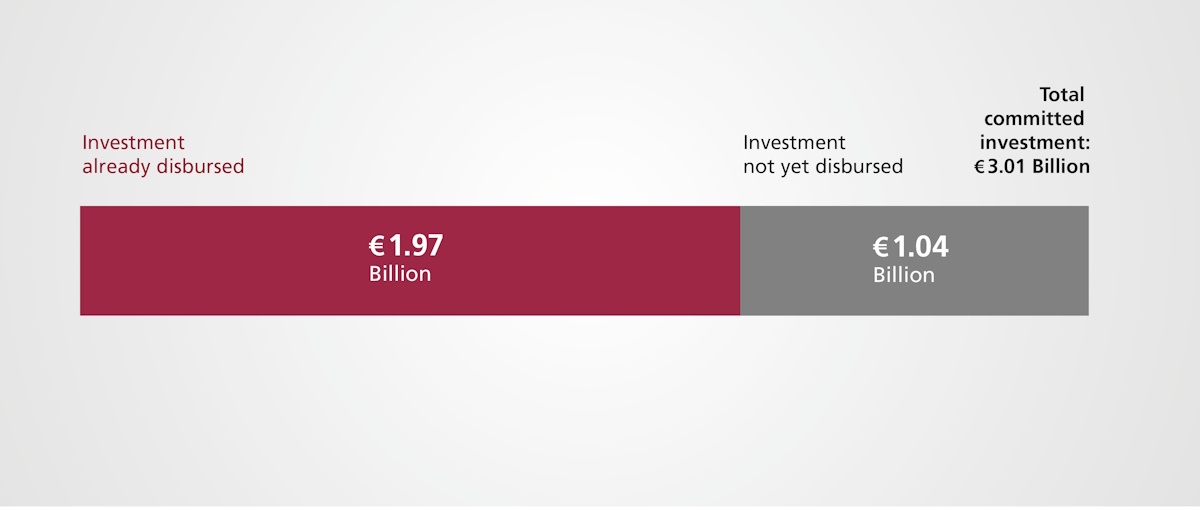
Source & data collection: Data provided by the Federal Ministry of Research, Technology and Space (BMFTR).
OECD Artificial Intelligence Papers September 2025 No. 47: Advancing the Measurement of Investments in Artificial Intelligence
Presented by Plattform Lernende Systeme

Research | Skills
Professorships funded by Federal Government
The funding of 150 additional professorships on AI in Germany secures and institutionalizes research and teaching on AI in the academic landscape. The establishment of the professorships is part of the German Federal Government's AI strategy.
150 additional professorships on AI funded (since 2019); of these, 38 filled by women & 54 appointed from abroad (as of July 2024)
- Distribution of professorships on AI
- 18 Alexander von Humboldt professorships
- 24 professorships at the 5 German Centres of Excellence for AI Research
- 85 professorships via the Tenure-Track programme
- 8 professorships via German Research Foundation (DFG) programs
- 15 professorships in cooperations between non-university research institutions and universities
Sponsored by the Federal Ministry of Research, Technology and Space (BMFTR)
Distribution of the 150 professorships on AI among 49 German universities
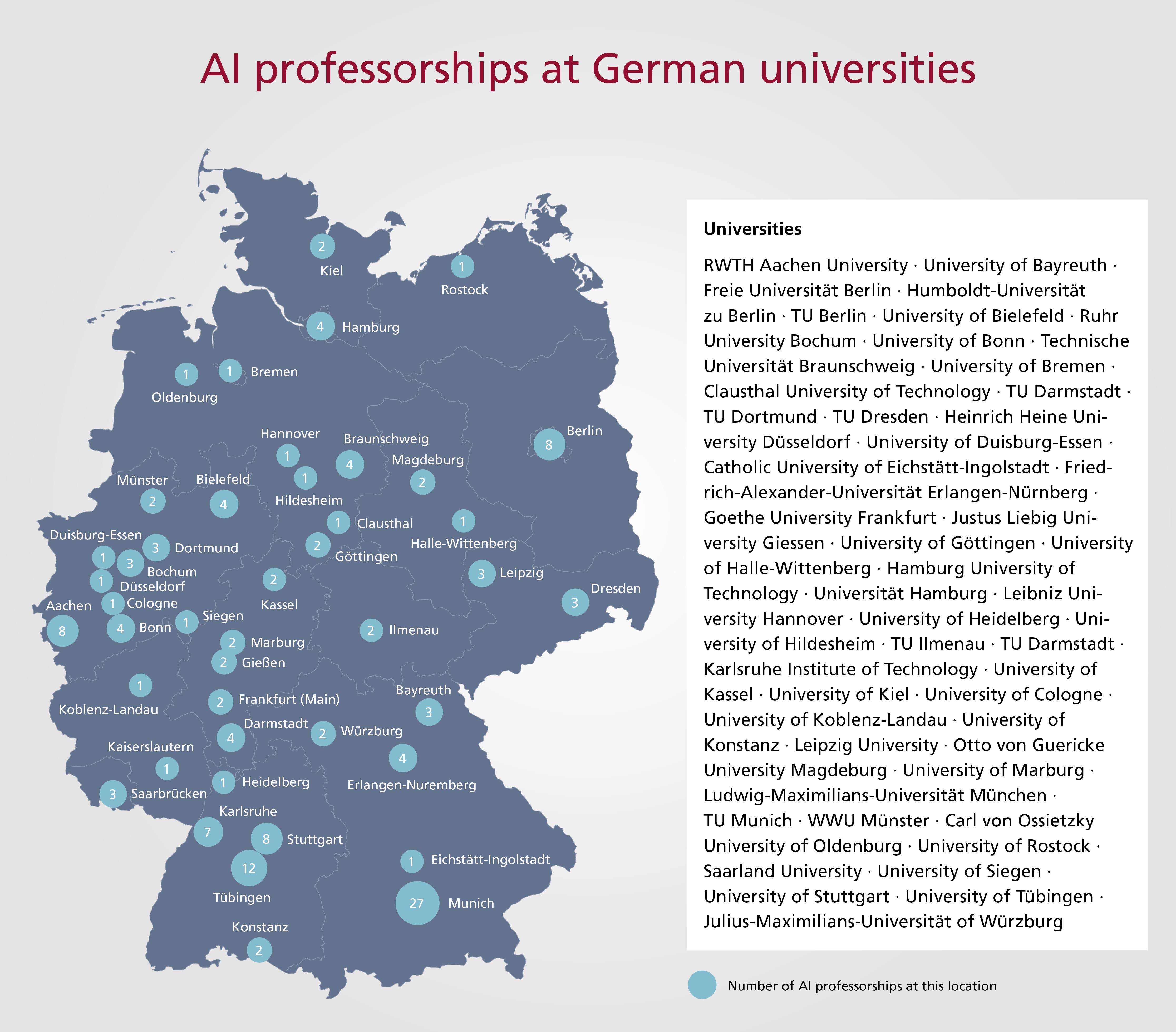
Source & data collection: Researched and presented by Plattform Lernende Systeme

Research
Publications and citations
When assessing Germany as a research location, the number of scientific articles published on AI by researchers at German universities and institutes is crucial. Furthermore, it is also important how often other researchers worldwide cite from these publications. This reveals not only the relevance of the research location, but also its interconnectedness in an international context.
Scientific articles on AI
Total number
Per 10 million inhabitants
Number of articles
Number of articles
From which countries/regions do scientific articles on AI come from that researchers worldwide cite the most?
Article origin (in percent)
Source & data collection: OECD AI Index; based on data from Elsevier (Scopus).
Scientific articles published by authors in the respective country are measured. In the case of co-authorship from different countries/regions, the articles are counted proportionally. To improve international comparability, the number of articles is set in relation to the population (articles per 10 million inhabitants). Citations are measured by the extent to which AI publications from the respective states/regions are cited by other researchers. The given year indicates the year of publication of the article, not the year of citation. Figures are rounded; calculated and presented by Plattform Lernende Systeme.
Figures are rounded; calculated and presented by Plattform Lernende Systeme

Research
German Centres of Excellence for AI Research
In addition to numerous institutions conducting research on AI, to strengthen the exchange between scientists in Germany, there exists a nationwide network of six leading AI research institutions at eleven locations. The resulting cooperation leverages synergies and increases international visibility. This network of cutting-edge research constitutes a cornerstone for the development of AI-technologies. The German Centres of Excellence for AI Research are funded by the German Federal Government and the federal states.
Nationwide network of six German Centres of Excellence for AI Research at eleven locations
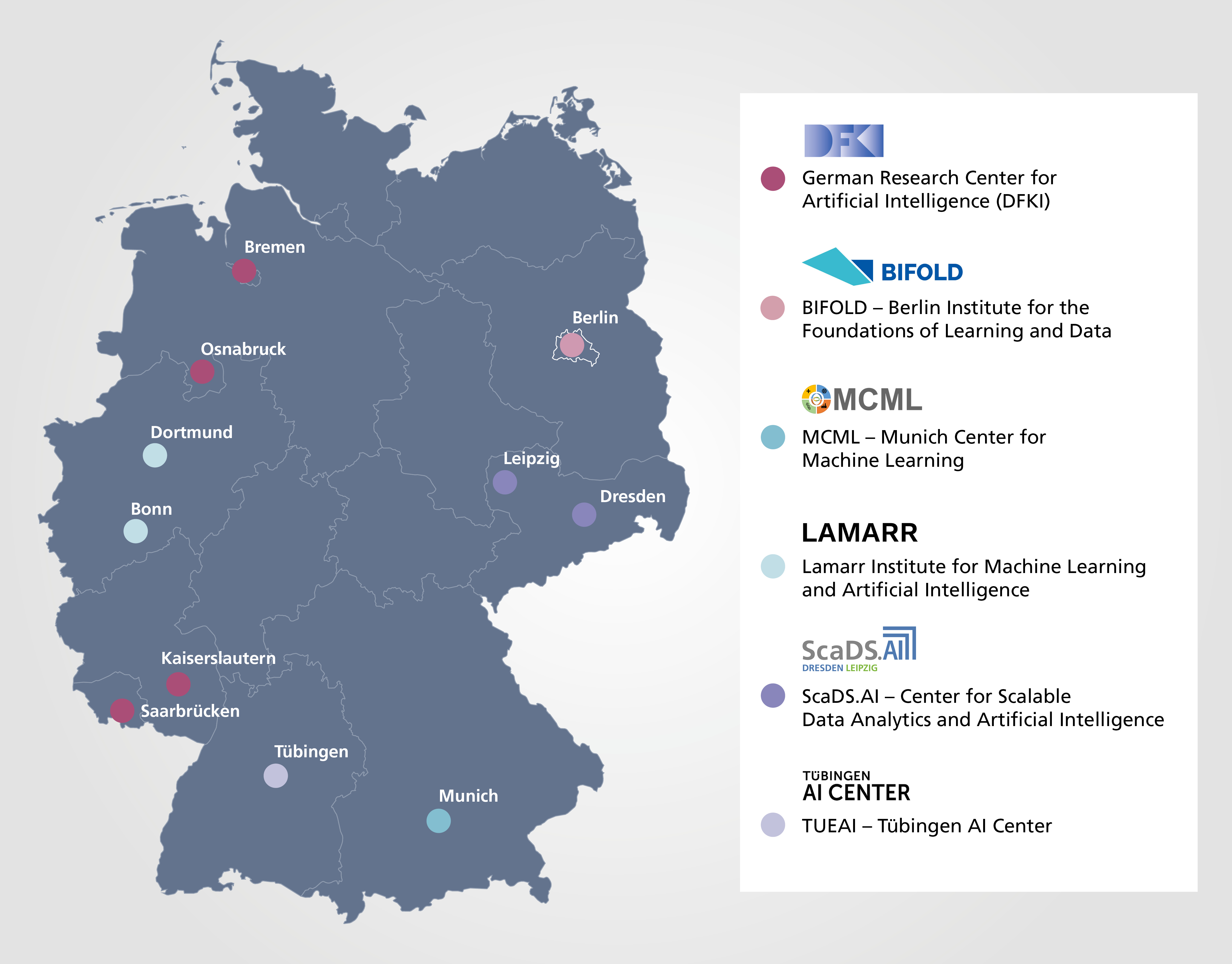
Source & data collection: Researched and presented by Plattform Lernende Systeme

Skills
Learning opportunities at high schools
In Computer Science lessons at school, young people can learn about the basics of digital transmission and processing of data. A fundamental understanding of Computer Science at a young age can be a foundation for later involvement (in studies, research, and work) with AI. Thus, the teaching of relevant material at school is central to the dissemination of AI skills in society and economy.
Computer Science as a subject in German high schools (as of October 2025)
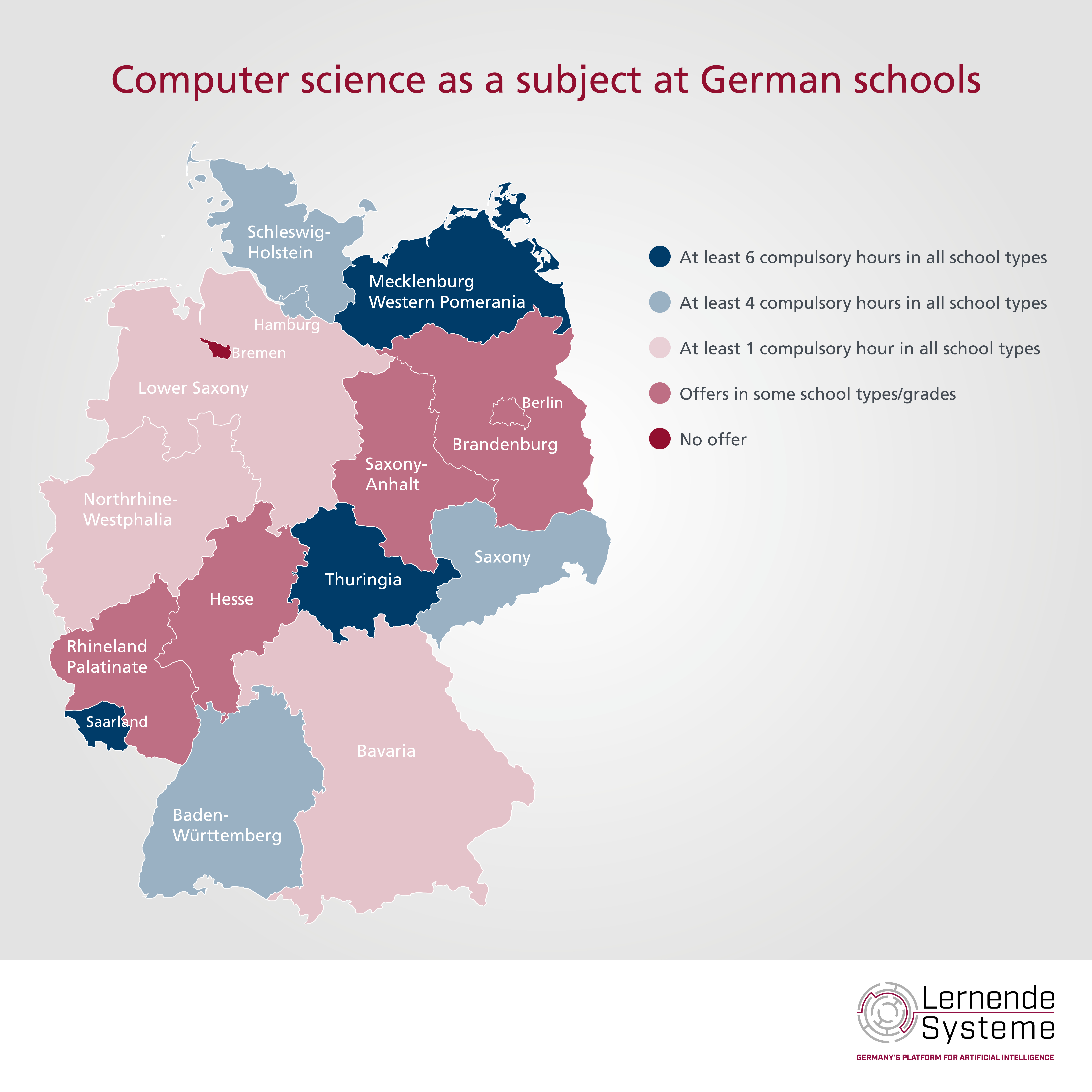
Source & data collection: Informatik-Monitor by German Informatics Society.
Only grade 5 and higher grades are taken into account; no Computer Science classes are offered below this grade level in Germany.
Presented by Plattform Lernende Systeme

Transfer
Grant programs for SMEs
In order to support the transfer from AI research to AI application, the German Federal Government and the federal states have set up 44 different programs. Small and medium-sized enterprises (SMEs) in Germany have access to a variety of public programs giving advice on the application of AI. This interlinkage of science and economy is particularly relevant for the successful implementation of AI technologies.
Promotion of AI transfer in SMEs through 31 grant programs nationwide (as of February 2026)
19 programs of the Federal Government
12 programs of the federal states
- Funding programs
- Funded by
- Duration
- Link
- Funding programs
- Funded by
- Duration
- Link
In order to support the transfer from AI research to AI application, the German Federal Government and the federal states have set up different programs. Small and medium-sized enterprises (SMEs) in Germany have access to a variety of public programs giving advice on the application of AI. This interlinkage of science and economy is particularly relevant for the successful implementation of AI technologies.
Source & data collection: This list covers active grant programmes for SMEs. Their application deadline may have already expired. Also covered are digitisation programmes under which SMEs can apply with AI projects.
Researched and presented by Plattform Lernende Systeme

Transfer
AI patents
AI patents are both the foundation and the consequence of successful research and application of AI technologies. The number of new patents filed worldwide by scientists from Germany is directly indicative for the country as a location of innovation and for the know-how generated there.
Newly filed AI patents
Total number
Per 10 million inhabitants
Newly filed AI patents
Newly filed AI patents
Source & data collection: Fraunhofer Institute for Systems and Innovation Research; based on data from the World Patents Index; also: Federal Statistical Office of Germany.
AI patents newly filed by scientists working in the respective countries or regions are taken into account. Since new filings are published with a delay of up to 18 months, data can only be presented with a corresponding delay. Second filings are not counted. To improve international comparability, the number of patent filings is set in relation to the population (patent filings per 10 million inhabitants).
Figures are rounded; calculated and presented by Plattform Lernende Systeme

Transfer
Publicly funded Transfer Hubs
Numerous institutions in Germany support the transfer of AI innovations from research to application. These Transfer Hubs offer companies of different sizes tailor-made consulting, support in AI application and a networking with the scientific community. This interlinkage of science and economy is particularly relevant for the successful implementation of AI technologies.
150 publicly funded transfer hubs on AI in Germany (as of 2025)
- Transfer Hubs
- Focus
- Funding
- 1 AI-facvtory
- IT infrastructure
- EU
- 64 other Transfer Hubs
- Digitisation, SMEs
- Federal Government, federal states, EU
Source & data collection: researched and presented by Plattform Lernende Systeme

Research | Skills
Junior research groups on AI
To strengthen young scientists in AI research, the German Federal Ministry of Research, Technology and Space (BMFTR) and the German Research Foundation (DFG) are funding 64 Junior Research Groups across Germany. These consist of young researchers. The Junior Research Groups focus on novel and innovative AI topics. In addition, the scientists in these groups have the opportunity to expand their research profile and their scientific visibility.
Overview of the 65 Junior Research Groups on AI (as of October 2025)
22 BMFTR-funded Junior Research Groups
28 BMFTR-funded Junior Research Groups Led by Women
15 DFG-funded Junior Research Groups
- Junior Research Group/Project
- Project coordination
- Understanding dynamic activities and behaviors from an egocentric perspective (UDance)
- Technical University of Munich
- Physics-based Machine Learning for hierarchical monitoring systems (PBML-HM)
- Helmholtz Center GFZ-Potsdam
- Operator-based training for time series analysis and modeling of complex dynamic systems (OIDLITDSM)
- Heidelberg University
- Multimodal learning with sound, image and text data (MuMoL)
- Technical University of Munich
- Junior Research Group/Project
- Project coordination
Source & data collection: Researched and presented by Plattform Lernende Systeme

Skills
Study programs related to AI
A wide selection of study programs that focus primarily or at least in several modules on AI or Data Science allows interested students in Germany to receive scientific training in these fields. They are the next generation of AI research and AI application.
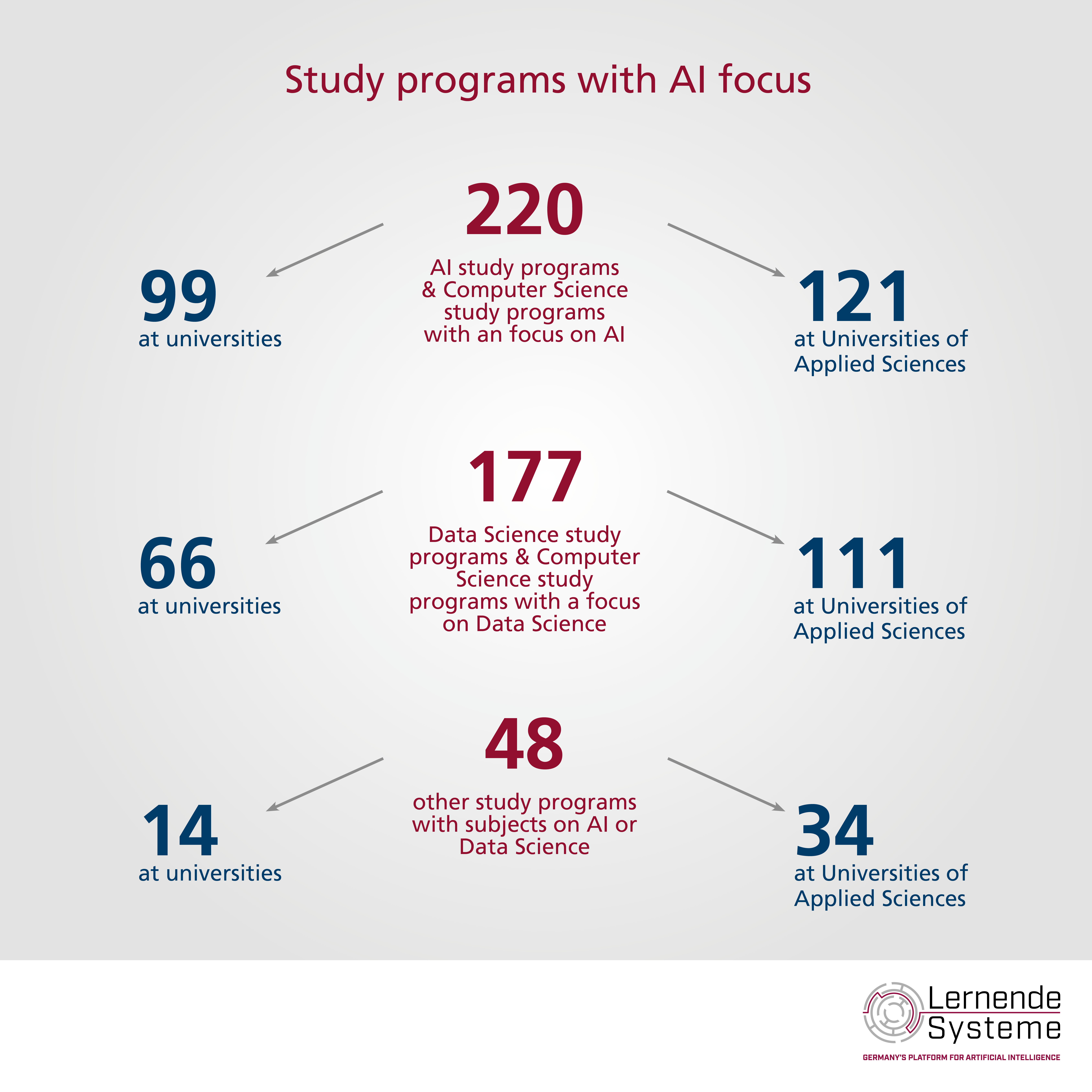
Source & data collection: Map on AI by Plattform Lernende Systeme; based on data from the Higher Education Compass offered by German Rectors' Conference (HRK) & on research by Plattform Lernende Systeme.
The analysis includes study programs that fully or partially focus on AI or on Data Science. Only state or state recognized universities are listed. The data is continuously updated by reviewing relevant publications. Due to deviations in analysis and its frequency, the number of study programs listed may differ from numbers in HRK's Higher Education Compass.
Presented by Plattform Lernende Systeme

Skills
Professionals' AI skills
For AI to be successfully applied in German companies, an important prerequisite is that the companies’ employees have a basic understanding of AI. The dissemination of AI skills is therefore relevant both for the individual training level of employees and for the companies’ ability to compete nationally and internationally.
Proportion of employees with AI Skills
Proportion of employees (in percent)
Source & data collection: OECD AI Index; based on the LinkedIn Economic Graph.
Here, the prevalence of AI skills among employees is measured. The index is based on information provided by useres of the social network LinkedIn on AI skills or on their employment at respective companies. The index shows the ratio of LinkedIn users with AI skills to all LinkedIn users in a certain country.
Figures are rounded; presented by Plattform Lernende Systeme

Transfer
AI startups
The number of new AI startups and the investment in them are indicators when observing the AI startup scene in Germany. The relevance of AI for the business models of young companies and the crucial role of startups in the application of AI is made visible. The performance of startups and the level of trust in them can be measured based on the private investment in young companies in the AI sector. In Germany, 502 AI startups have been founded in the past ten years. Private investment in young AI companies amounted to $2,16 billion in 2023.
Newly founded AI startups and private investment in AI startups (since 2013)
Newly founded AI startups in Germany
Private investment in German AI startups
Newly founded AI start-ups
Investment (in Mio. Dollar)
Source & data collection: OECD AI Index; based on data by Preqin
The German AI Startup Landscape records newly founded startups in Germany whose activities are related to Machine Learning. Primarily, startups are inlcuded that apply and/or develop AI. Startups newly founded in the most current year may be underrepresented and will be leveled in follow-up surveys. The Stanford AI Index measures the private investment in German AI startups.
Figures are rounded; presented by Plattform Lernende Systeme